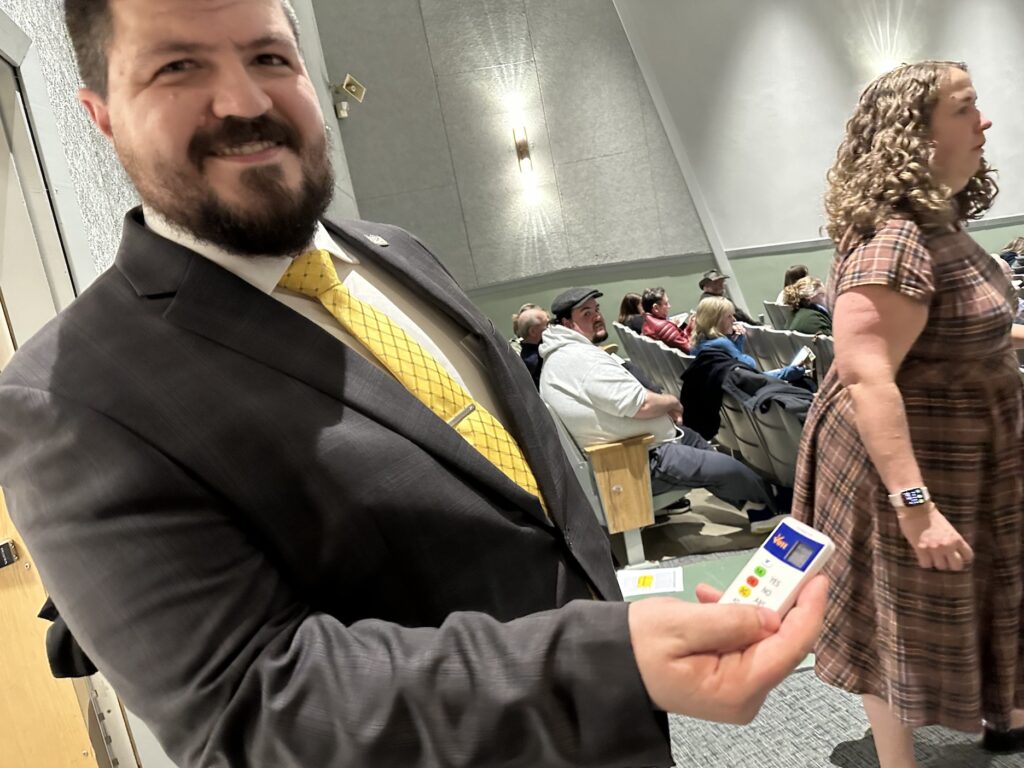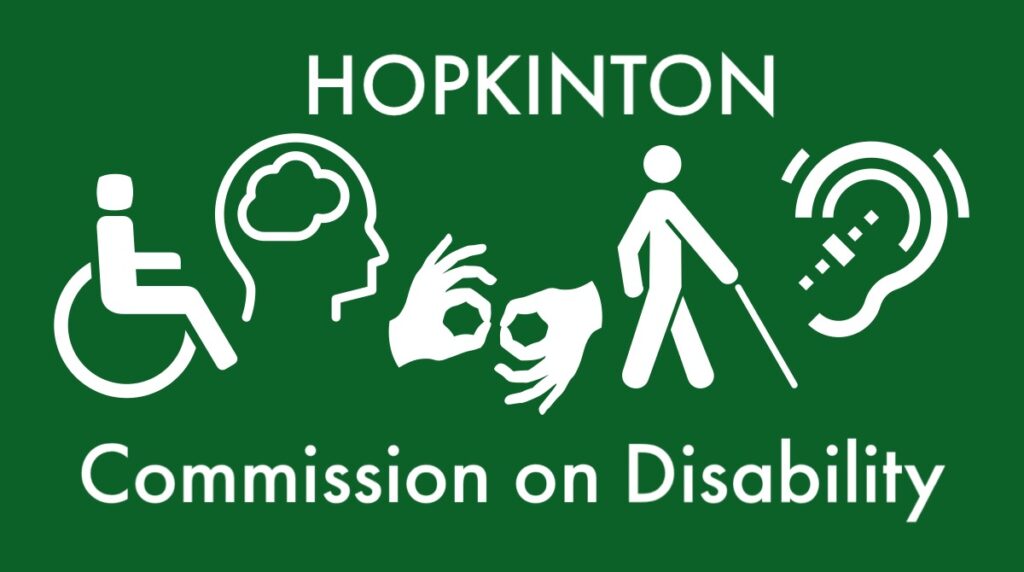
Town Clerk Connor Degan, who served as moderator at Monday’s Special Town Meeting, displays one of the electronic voting units that was used for the first time in Hopkinton. PHOTO/JERRY SPAR
While the 622-241 approval vote for the new Elmwood School building was the primary focus of Monday night’s Special Town Meeting, the body also narrowly approved Article 2 to eliminate party caucuses being able to nominate candidates to town ballots. It also defeated the proposed article to adopt the state’s specialized stretch energy code, which was approved earlier this year by the state as an amendment to the current stretch code.
The meeting experienced some initial delays as people filed into Hopkinton Middle School during a light snowfall at the meeting’s start. This was the first time an electronic voting system was used for Town Meeting. Town Clerk Connor Degan, who filled in as the moderator, demonstrated the system once the crowd settled in.
Article 2 passes 245-214, eliminating candidate nomination by party caucuses
After debate about the role of political parties in town politics, Article 2 passed by 31 votes, ending the process of political caucuses being able to nominate candidates. Hopkinton was one of only 16 towns in Massachusetts that still used the party caucus system.
Article 2 was proposed by residents John Cardillo and Ed Harrow. Cardillo presented a graph showing elections over the past eight years, pointing out that there was “a fairly even distribution” among party candidates until 2016, when former President Donald Trump was elected. From 2017 on, there was a “fairly large increase” in candidates nominated at their respective party’s caucus, he noted.
“The Republican and Democratic parties in the town of Hopkinton will continue and will flourish and grow,” Cardillo stressed.
He noted that preliminary caucuses will no longer exist with the passage of this article, and party affiliation of candidates will not be displayed on town ballots. This move, he said, would force candidates “to do the legwork” to get signatures to appear on the ballot, as well as to educate voters about their positions and to raise funds.
Residents debated the importance of knowing a candidate’s affiliation versus the political polarization that has occurred for several years, most notably on a national level. A couple of residents explained that they won offices after receiving support at party caucuses. Others said the issue of seeing a party affiliation was about transparency.
College student Tim Fargiano urged voters to approve the article to “remove institutional advantages for partisan candidates in town elections.”
“While party affiliations and ideologies are fundamentally important to our national political system,” he said, “the issues of Hopkinton have little to do with the national priorities of the Republican and Democratic parties.”
Michael King argued that party caucuses increase participation in the political process. But Jared Pray noted that party affiliation is only shown on the ballot for candidates who received their caucus’s endorsement.
Jane Murdoch said it was the right of voters to know everything they can about a candidate, including party affiliation.
Ashley Fogg, who ran for a School Committee seat as an unenrolled candidate in the last two elections, spoke in favor of the article. She was beaten in the last election by two Democrats in a hotly contested race.
“I feel as a candidate for the School Committee that I was the target of a smear campaign just because I tried to represent an independent voice,” she said.
The article required a simple majority vote for passage.
Article 3 on adopting state’s specialized stretch energy code article defeated 121-216
The Sustainable Green Committee proposed Article 3, which called for Hopkinton to adopt the state’s specialized stretch energy code to promote energy efficiency in new construction. It was soundly defeated after some residents said more details were needed about its impact on potential new construction.
Sustainable Green Committee chair Geoff Rowland explained that the specialized code is now the “top tier” of building codes. It only applies to new construction.
“It was specifically designed to prepare new construction to meet the net zero goals of the state,” he said.
The article would have required new housing and commercial buildings to be wired for the capability to be all electric. It would only require new buildings of over 4,000 square feet to be solely electric — or have sufficient solar to offset annual energy usage [Editor’s note: last part added in as clarification].
Hopkinton previously voted to pursue net zero emissions by 2045, Rowland said. Requiring new construction to move away from using fossil fuels would help the town achieve this goal.
Sustainable Green Committee member Nicole Simpson added that iuf a gas furnace is installed, the building must have the wiring capability for an electric heat pump. New buildings that use fossil fuels must also install solar panels on-site to compensate for their use. She noted that the policy does not cost the town anything.
Said Simpson: “It encourages building healthy homes from the beginning that aren’t powered by fossil fuels.”
Resident Jim Mirabile said that while he supports energy efficiency, he cautioned against “unintended consequences.” He asked that the Sustainable Green Committee “take a closer look” at the state’s policy and perhaps present some part of it as an article at Annual Town Meeting next May.
If the article passed, it would have gone into effect July 1, 2024. If the town considers it at the May 2024 Annual Town Meeting, it would not be able to be enacted until Jan. 1, 2025.
Resident Bill Flannery noted that a similar proposal recently was defeated in Ashland. He urged the town “to take a step back” and reconsider the idea next May.
Resident John Coutinho, who works in construction, said the costs for required electrical wiring may discourage businesses from coming to town, particularly those in the biotech industry. He said it should be revisited in May when there is more information available.
No action on Article 4 on town parking lot
Article 4 regarded the purchase of land for municipal parking in the vicinity of Town Hall. No action was recommended by the Select Board, the Appropriation Committee and the Capital Improvement Committee.
The vote was 271 in favor of no action, with 30 opposed.




















0 Comments